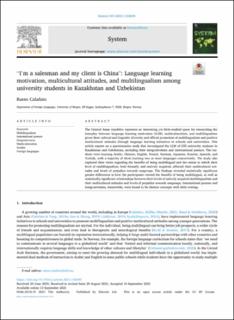“I’m a salesman and my client is China”: Language learning motivation, multicultural attitudes, and multilingualism among university students in Kazakhstan and Uzbekistan
Journal article, Peer reviewed
Published version

Åpne
Permanent lenke
https://hdl.handle.net/11250/2778984Utgivelsesdato
2021Metadata
Vis full innførselSamlinger
Sammendrag
The Central Asian republics represent an interesting yet little-studied space for researching the interplay between language learning motivation (LLM), multiculturalism, and multilingualism given their cultural and linguistic diversity and official promotion of multilingualism and positive multicultural attitudes through language learning initiatives in schools and universities. This article reports on a questionnaire study that investigated the LLM of 235 university students in Kazakhstan and Uzbekistan, including their integrativeness and international posture. The students were learning Arabic, Chinese, English, French, German, Japanese, Russian, Spanish, and Turkish, with a majority of them learning two or more languages concurrently. The study also explored their views regarding the benefits of being multilingual and the extent to which their level of multilingualism, both formally and natively acquired, affected their multicultural attitudes and levels of prejudice towards outgroups. The findings revealed statistically significant gender differences in how the participants viewed the benefits of being multilingual, as well as statistically significant relationships between their levels of natively acquired multilingualism and their multicultural attitudes and levels of prejudice towards outgroups. International posture and integrativeness, meanwhile, were found to be distinct concepts with little overlap.
